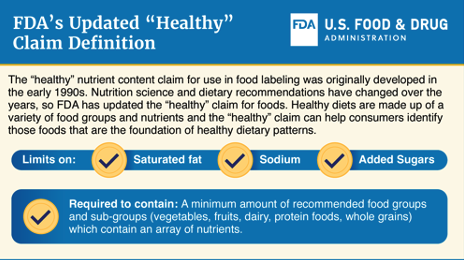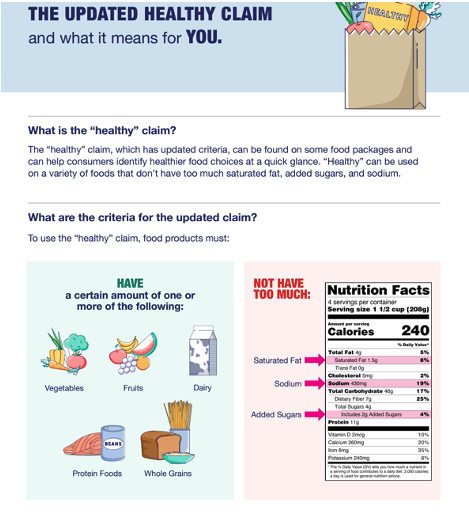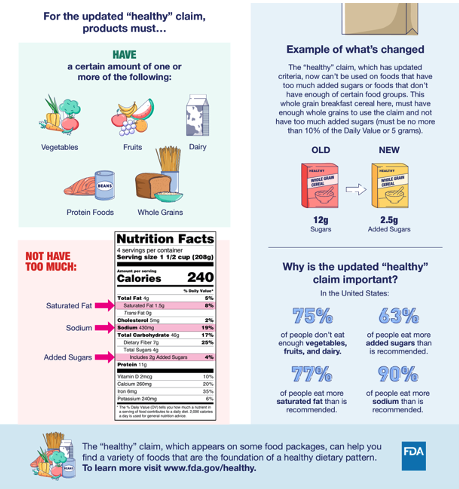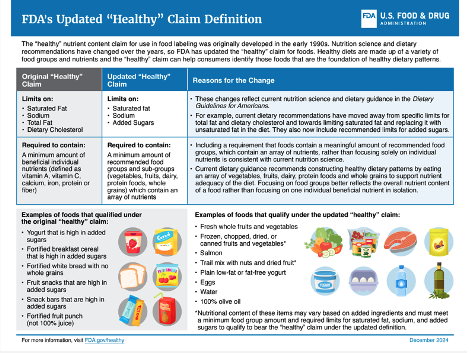Are Tomato Products “Healthy”?
You may have read the headlines that the FDA just updated their definition of the term “healthy” as it relates to foods and beverages on store shelves. The FDA issued this final rule based on the latest health science available, so that consumers may easily identify foods in supermarkets that promote nutritious diets and ultimately help reduce the risks of chronic diseases, such as type 2 diabetes and heart disease. Improving nutrition is one of the best ways you can help prevent these diseases. In order for food products, like tomato products, to use the claim “healthy” on food labels they must follow specific criteria (see below) that were recently updated by the FDA. Since consumers rely on food labels to help guide them to making good choices, the use of “healthy” on food labels is a good thing! And given the new guidelines, when you see “healthy” on a food label you can rest assured that the food has met these new criteria for nutrition qualities in the food product that are healthful for you and your family. This new rule applies to a number of terms on labels, including “health, “healthful,” “healthfully,” “healthfulness,” “healthier,” “healthiest,” “healthily,” and “healthiness.” These types of claims on food labels are considered implied nutrient content claims, because they suggest that a food may provide health benefits to people who choose them. The good news is that many tomato products fit perfectly into the criteria for “healthy,” because they are food products packed with real tomatoes, rich in many nutrients that support wellness.
FDA Criteria for “Healthy” on Food Labels
It’s exciting that the new “healthy” guideline emphasizes nutrient-dense foods, such as vegetables. Many tomato products—based on whole tomatoes—automatically qualify as “healthy”.
According to the new FDA guidelines, foods must meet the following criteria to be “healthy.”
- Vegetables, fruits, whole grains, fat-free and low-fat dairy, lean game meat, seafood, eggs, beans, peas, lentils, nuts, and seeds with no added ingredients except for water, automatically qualify for the “healthy” label. Many no added salt tomato products, such as canned diced, whole, or crushed tomatoes; tomato sauce, and tomato puree fit neatly into this category, as these foods are made with vegetables—delicious, wholesome tomatoes—with no other added ingredients other than water.
- Foods that provide the food group equivalent for a food group, meaning that a serving of the food product must deliver a full serving of the intended food group. In the case of tomato products, each ½ cup serving of canned diced, whole, or crushed tomatoes, tomato or marinara sauce, 100% tomato juice, and salsa delivers a full ½ cup equivalent of vegetables. And ¼ cup of tomato paste—which is a concentrated source of tomatoes—provides a full ½ cup serving of tomatoes. One cup of concentrated tomato soup provides a ¼ cup serving of tomatoes.
- Foods must meet the added sugar limit: 2% of the Daily Value (DV), which equals 1 gram of added sugar per serving. Many tomato products, such as canned diced, whole, or crushed tomatoes, tomato sauce, tomato paste, 100% tomato juice, and salsa are made without the addition of added sugars. You can read the Nutrition Facts labels to ensure your favorite tomato products achieve this level of added sugars.
- Foods must meet the sodium limit, which is 10% of the Daily Value (DV) or 230 mg per serving. Many tomato products, such as canned diced, whole, or crushed tomatoes, tomato sauce, and tomato puree, are below this threshold for sodium. You can look for no added salt products, or scan the nutrition facts label for sodium in your favorite tomato products—even those tomato products with added sodium may be below these levels.
- Foods must meet the saturated fat limit, which is 5% of the Daily Value (DV) or 1 gm per serving. Tomatoes and tomato products do not inherently contain appreciable levels of saturated fat. Most tomato products, including canned diced, whole, or crushed tomatoes, tomato sauce, and tomato puree—contain no saturated fat-containing ingredients, unless otherwise noted on labels.
Bottomline on Healthy Tomato Products
Tomato products capture the essence of freshly harvested tomatoes. These delicious foods are a budget-friendly, accessible source of vegetables in your diet, and they can provide multiple nutrients, including vitamins A and C, potassium, iron, and fiber. In addition, they contain rich sources of the antioxidant compound lycopene, which is even more bioavailable in canned tomatoes compared to fresh. The nutrition profile of tomatoes—one of the most beloved vegetables in our diets—is linked with multiple health benefits, including reduced risks of cardiovascular disease and certain types of cancer. No wonder tomato products are a key part of many wholesome traditional diet patterns, including the Mediterranean diet and Latin American diet.
Sharon Palmer, MSFS, RDN
Learn more about these new “healthy” food guidelines here.




Recent Comments